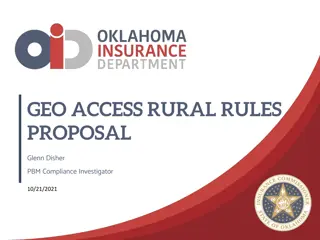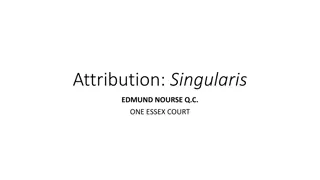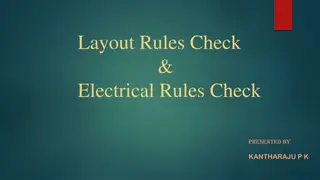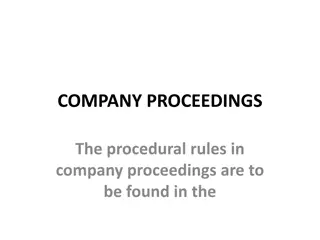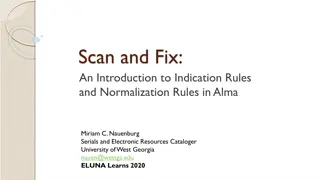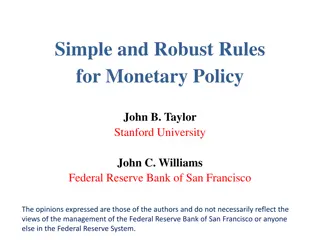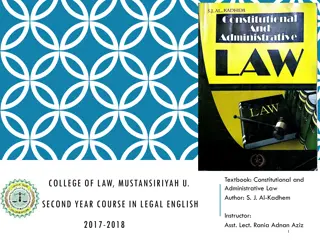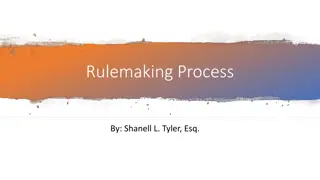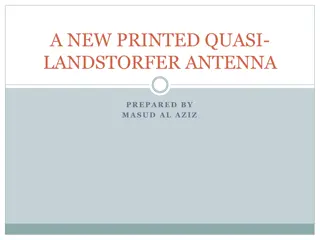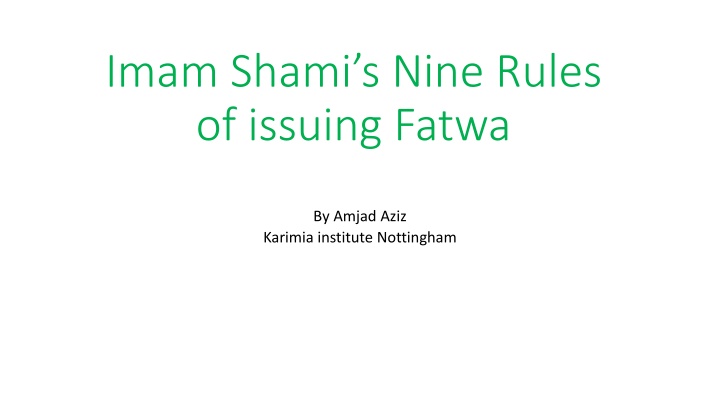
Imam Shami's Nine Rules of Issuing Fatwa in Hanafi Fiqh
Explore the nine rules of issuing fatwa according to Imam Shami's collection from various Hanafi Fiqh books, emphasizing the precedence given to opinions of Imam Abu Hanifa, Qadi Imam Abu Yousuf, and Imam Muhammad. Learn about Istihsan and the principles guiding fatwa issuance in worship, court cases, and family law in the Hanafi school of thought.
Download Presentation

Please find below an Image/Link to download the presentation.
The content on the website is provided AS IS for your information and personal use only. It may not be sold, licensed, or shared on other websites without obtaining consent from the author. If you encounter any issues during the download, it is possible that the publisher has removed the file from their server.
You are allowed to download the files provided on this website for personal or commercial use, subject to the condition that they are used lawfully. All files are the property of their respective owners.
The content on the website is provided AS IS for your information and personal use only. It may not be sold, licensed, or shared on other websites without obtaining consent from the author.
E N D
Presentation Transcript
Imam Shamis Nine Rules of issuing Fatwa By Amjad Aziz Karimia institute Nottingham
1 1. . Precedence given to the opinion of Imam Abu Precedence given to the opinion of Imam Abu Hanifa Hanifa in Worship in Worship Imam Ibn e Abdeen Shami has collected nine rules from various books of Hanafi Fiqh to be considered while issuing fatwa which are summed up in Arabic Couplets . If there is difference of opinion in verdicts relate to Fiqh ul ibadat then final verdict will be according to the opinion of Imam Abu Hanifa.( Sharh Kabirie by Allama Ibrahim Halabi) If any other opinion is taken contrary to the opinion of the Imam . It is mostly considered as a second opinion of the Imam . Examples: to do Tayammum if don t find water except Nabeez e tammar ( dates juice) Asr prayer timing Overall carefulness in categories of Fard, wajib etc
2 2. . Precedence given to the opinion of Qadi Imam Abu Yousuf in Precedence given to the opinion of Qadi Imam Abu Yousuf in issues relating to the court issues relating to the court In cases which are referred to the court , precedence is given to the opinion of imam Abu Yousuf , this is due to his vast experience of working as a justice.( albahr al raaiq, Fatawa bazaziah) ( difference between Qadi and Mufti) Due to Imam Abu Yousuf s practical work in Qada, his knowledge of analysing the practicality of issue is better than theoretical opinion . In matters related to witnesses , the opinion of Imam Abu Yousuf will be taken Example:
3.Precedence given to the opinion of Imam Muhammad in Precedence given to the opinion of Imam Muhammad in issues relating to the family law issues relating to the family law In all issues related to the heritage , the precedence is given to the opinion of Imam Muhammad al shaybani. ( ) He is titled And compiled are 6 books . which is the encyclopedia of Fiqh Hanfi which
4 4. The . The Istihsan Istihsan will be taken will be taken without Qiyas without Qiyas Definition of istehsan: According to Fiqh Hanafi the fourth source of Islamic Law is Qiyas which is a conclusion of law based on a definite text of Quran , prophetic tradition or Ijma . Istihsan is in its literal sense is to consider something good . Scholars Express their preference for particular judgements over other possibilities. It's possible to take the second opinion of Qiyas as well according to Allama Fakhar ul Islam Bazudi.
5 5. The Fatwa will be issued according to the . The Fatwa will be issued according to the 6 6 books of books of Zahir Zahir ul Riwayah ul Riwayah Opinions will not be taken which are contradict to Zahir al Rawaya . Because they are rejected by al-Mujtahid and rejected ( opinions are not considred the opinion of Mujtahid .( A Muqallid Qadi can only give his verdict according to Zahir al Rawaya and cant not use exceptional opinion ( Judgement could be made out of Zahir al Rawaya if opinion is nor found there . ) ) )
6 6. The use of logic and argument will be preferred in issues . The use of logic and argument will be preferred in issues If judgment based on logic and intellect( ) is supported by Text ( ) then its must be preferred on other options. ( The word also used For evidence ( ) and if there are more then one opinions on one particular issue are seen then the judgment will be based on powerful evidence. ( )
7 7. The utmost care should be taken when dealing with issues of . The utmost care should be taken when dealing with issues of apostasy apostasy The Seventh Rule is very crucial which is to avoide of issuing fatwa on Kuffr of some Muslim if one weak evidence of his Iman is found. ( ) If there is any of possibilities to take some other meanings of text which leads to Kuffer, then other meanings will be considred . If there are difrence of opinions on Kufferia Text then other meanings will be taken even if they are weak in judgment. ( )
8 8. The weak position will not be accepted. . The weak position will not be accepted. The final opinion of Mujtahid will be his actual opinion and old opinion will be considred rejected (mansookh. It is important to find the new opinion of Mujtahid to follow it . It's not allowed to take the opinion of Mujtahid from which he turned back.( ) If it's not clear which opinion is new then both will be narrated.
9 9. A juristic position must have precedence in Hanafi . A juristic position must have precedence in Hanafi Fiqh Fiqh The last rule is to find the evidence of any opinion in original text of the books of Fiqh Hanafi . ( Original Text ( ) is written very carefully on base of authentic references and outside opinions need to be verified and if they are supported by original text then opinion is authentic . Imam Shami If there is contradict between original text and any Fatwa then original text will be considred powerful (. ) )






